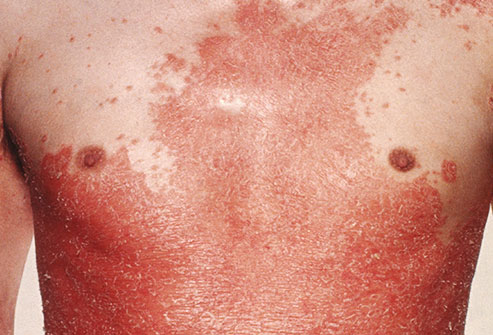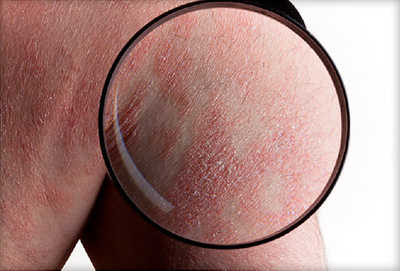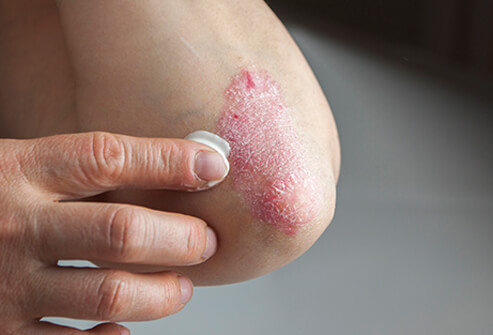Psoriasis can be described as a condition of the skin that alters skin cells' life cycle. If you suffer from this condition, it will cause your skin cells to build up fast on the surface of the skin. This results in the growth of a dry, itchy, thick and silvery skin surface that can at times be painful. It is a chronic condition. This condition sometimes gets better and will at other times become worse. If you suffer from psoriasis, it is important for you to learn as much as you can about this condition. Most people with this condition will hide it from people fearing that the disease is contagious. So, is psoriasis really contagious?
Is Psoriasis Contagious?
 Contrary to most people’s belief, psoriasis is not contagious. As opposed to other skin conditions such as impetigo, MRSA as well as scabies, psoriasis is not caused by contagious bacteria. Actually, psoriasis is an autoimmune disorder. For you to develop psoriasis, you must have certain types of genes, according to the AAD (American Academy of Dermatology). With these genes, environmental triggers will easily activate the condition.
Contrary to most people’s belief, psoriasis is not contagious. As opposed to other skin conditions such as impetigo, MRSA as well as scabies, psoriasis is not caused by contagious bacteria. Actually, psoriasis is an autoimmune disorder. For you to develop psoriasis, you must have certain types of genes, according to the AAD (American Academy of Dermatology). With these genes, environmental triggers will easily activate the condition.
There are five different types of psoriasis. Each of them results in a scaly rush that looks contagious. These are:
- Plaque psoriasis – this results in red rush that look like slightly raised skin patches. The patches are covered by dead sells that are characterized by a scaling silvery look.
- Guttate psoriasis – this type of psoriasis is characterized by the development of red spots on the skin. It often happens after certain illness or infection like strep throat.
- Pustular psoriasis – this type is characterized by puss filled, raised and painful bumps that mostly occur on the soles and palms, which may be itchy. Other symptoms include chills, fever, and appetite loss.
- Inverse psoriasis – this type of psoriasis is characterized by red patches on the skin that are sore. This type normally occurs along skin folds.
- Erythrodermic psoriasis – this type of psoriasis is characterized by reddening of the skin. It looks like severe sunburn. This is a dangerous type of psoriasis since it makes it hard for the body to regulate its temperature and can lead to increase in heart rate, severe itching as well as severe pain.
What Causes Psoriasis?
Is psoriasis contagious? No. Then what exactly causes it? There is no clear explanation for the cause of psoriasis. It is believed that the condition occurs because of the overreaction of T-cells. These are simply the cells that protect the body from viruses and bacteria. For one to suffer from psoriasis, these T-cells attack healthy cells of the skin which results in immune responses. In turn, this leads to the overproduction of skin cells, T-cells and white blood cells.
This is what leads to the overproduction of skin cells which accumulate on the surface of the skin. This is what causes the scaly, silvery layer of cells. Usually, a week is needed for formation of new skin cells. However, the process is quicker in people with psoriasis. Skin cells in this case form within days. However, the body doesn’t shed the extra cells and this is how the lesions are formed.
Triggers
There are also several lifestyle and environmental factors that trigger this condition. It is important to note that not every type of psoriasis is triggered by the same conditions. Therefore, the triggers can vary from one type to the next.
Common psoriasis triggers include:
- Smoking
- Exposure to sunlight
- Infections
- Stress
- Bug bites, burns, cuts as well as other skin traumas
- Exposing skin to cold temperatures
- Too much use of alcohol
- Some medications like iodides, medication for blood pressure as well as lithium.
It is important to note that smoking is not just a trigger. It can also be a cause of the development of psoriasis and also plays a role when it comes to the severity of the disease. According to research, smoking is the cause for every 1 in 5 psoriasis cases. It also increases your chances of getting it. This is believed to be a result of the effects nicotine has on your skin cells, the immune system as well as skin inflammation. Besides, there are also claims that some food types as well as allergies are triggers. However, these claims are mostly said to be anecdotal.
Can Psoriasis Be Spread?
Is psoriasis contagious? No, psoriasis is not contagious. Therefore, it is impossible for it to be spread amongst individuals. But when one has the condition, it is common for it to develop on other parts of the body over time. And, the most affected areas are the elbows, ears, scalp, and knees, between butt cheeks as well as the lower back.
How Can Psoriasis Be Treated?
Home Care
- Take a bath daily: When you bathe daily, you help to remove the scales from the skin and this calms the inflamed skin. You can use bath oil, Epsom salts as well as colloidal oatmeal in the bath water. Avoid very hot water and instead use lukewarm water with mild soap to avoid worsening the symptoms.
- Using moisturizers: After bathing, always ensure you use a moisturizer before the skin hardens. If you have very dry skin, you can use oils as an alternative. This is because of their staying power on your skin. If it’s in a cold or dry season, consider applying moisturizers several times during the day.
- Avoid skin exposure to the sun: It is advisable to control the amount of sunlight you expose your skin to. Too much heat from the sun can trigger the symptoms and even worsen them. This also runs the risk of development of skin cancer.
- Avoid triggers: It is advisable to find out the triggers that you’re most vulnerable to and try to avoid them. This makes it easier for you to manage the condition.
- Avoid alcohol: Indulging in alcohol consumption can lower the effectiveness of the treatment for psoriasis.
Medications
When undergoing treatment for psoriasis, you aim to slow down the process of cells growth which reduces skin inflammation as well as formation of plaque, and to smoothen the skin by getting rid of the scales. There are 3 main types of psoriasis treatments. Systematic medications, tropical treatment and light therapy.
Tropical treatment
Is psoriasis contagious? No. But treating it is still of great importance. You can treat mild and moderate psoriasis using ointments and creams. They may be combined with oral medicine or even light therapy.
Tropical psoriasis treatments include:
- Topical corticosteroids
- Anthralin
- Vitamin D analogues
- Topical retinoids
- Salicylic acid
- Moisturizers
- Calcineurin inhibitors
- Coal tar
Light therapy
This typically uses UV light in its natural or artificial form to treat psoriasis. Examples include:
- Sunlight
- UV phototherapy
- Narrow band UV therapy
- Photo chemotherapy or psoralen plus ultraviolet A
- Goeckerman therapy
- Excimer laser
Oral injected medications
This type of treatment is mostly administered to people with severe psoriasis. Most of the medications can only be used over short periods of time since they have severe side effects. These meds include:
- Retinoids.
- Methotrexate
- Cyclosporine
- Drugs that alter the immune system
